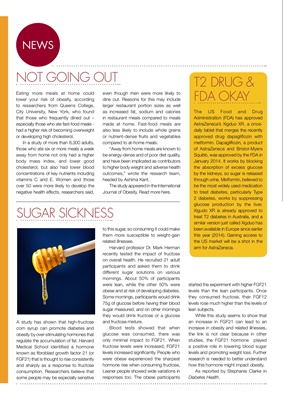
NEWS
NOT GOING OUT
SUGAR SICKNESS
T2 DRUG &
FDA OKAY
The US Food and Drug
Administration (FDA) has approved
AstraZeneca's Xigduo XR, a oncedaily tablet that merges the recently
approved drug dapagliflozin with
metformin. Dapagliflozin, a product
of AstraZeneca and Bristol-Myers
Squibb, was approved by the FDA in
January 2014. It works by blocking
the absorption of excess glucose
by the kidneys, so sugar is released
through urine. Metformin, believed to
be the most widely used medication
to treat diabetes, particularly Type
2 diabetes, works by suppressing
glucose production by the liver.
Xigudo XR is already approved to
treat T2 diabetes in Australia, and a
similar version just called Xigduo has
been available in Europe since earlier
this year (2014). Gaining access to
the US market will be a shot in the
arm for AstraZeneca.
A study has shown that high-fructose
corn syrup can promote diabetes and
obesity by over-stimulating hormones that
regulate the accumulation of fat. Harvard
Medical School identified a hormone
known as fibroblast growth factor 21 (or
FGF21) that is thought to rise consistently
and sharply as a response to fructose
consumption. Researchers believe that
some people may be especially sensitive
Eating more meals at home could
lower your risk of obesity, according
to researchers from Queens College,
City University, New York, who found
that those who frequently dined out -
especially those who ate fast-food meals -
had a higher risk of becoming overweight
or developing high cholesterol.
In a study of more than 8,300 adults,
those who ate six or more meals a week
away from home not only had a higher
body mass index, and lower good
cholesterol, but also had lower blood
concentrations of key nutrients including
vitamins C and E. Women and those
over 50 were more likely to develop the
negative health effects, researchers said,
even though men were more likely to
dine out. Reasons for this may include
larger restaurant portion sizes as well
as increased fat, sodium and calories
in restaurant meals compared to meals
made at home. Fast-food meals are
also less likely to include whole grains
or nutrient-dense fruits and vegetables
compared to at-home meals.
"Away from home meals are known to
be energy-dense and of poor diet quality,
and have been implicated as contributors
to higher body weight and adverse health
outcomes," wrote the research team,
headed by Ashima Kant.
The study appeared in the International
Journal of Obesity. Read more here.
to this sugar, so consuming it could make
them more susceptible to weight-gain
related illnesses.
Harvard professor Dr. Mark Herman
recently tested the impact of fructose
on overall health. He recruited 21 adult
participants and asked them to drink
different sugar solutions on various
mornings. About 50% of participants
were lean, while the other 50% were
obese and at risk of developing diabetes.
Some mornings, participants would drink
75g of glucose before having their blood
sugar measured, and on other mornings
they would drink fructose or a glucose
and fructose mixture.
Blood tests showed that when
glucose was consumed, there was
only minimal impact to FGF21. When
fructose levels were increased, FGF21
levels increased significantly. People who
were obese experienced the sharpest
hormone rise when consuming fructose,
Leaner people showed wide variations in
responses too. The obese participants
started the experiment with higher FGF21
levels than the lean participants. Once
they consumed fructose, their FGF12
levels rose much higher than the levels of
lean subjects.
While this study seems to show that
an increase in FGF21 can lead to an
increase in obesity and related illnesses,
the link is not clear because in other
studies, the FGF21 hormone played
a positive role in lowering blood sugar
levels and promoting weight loss. Further
research is needed to better understand
how this hormone might impact obesity.
As reported by Stephanie Clarke in
Diabetes Health.